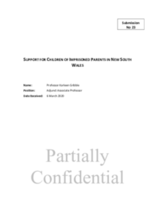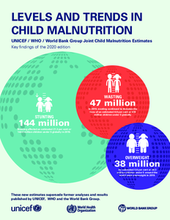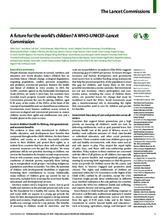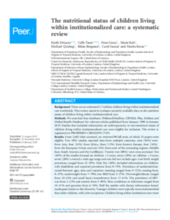Displaying 41 - 50 of 243
In this Submission to the Inquiry into Support for Children of Imprisoned Parents, Karleen Gribble, Adjunct Associate Professor in the School of Nursing and Midwifery at Western Sydney University, comments on "the situation of infants and young children whose mothers are incarcerated and the support or undermining of their health and wellbeing in the justice system."
The inter-agency team released new joint estimates for child stunting, overweight, underweight, wasting and severe wasting (March 2020 edition) using the same methodology as in previous years.
This WHO–UNICEF–Lancet Commission lays the foundations for a new global movement for child health that addresses the two crises of climate change and predatory commercial exploitation, and presents high-level recommendations that position children at the centre of the Sustainable Development Goals (SDGs).
This review from PeerJ aimed to evaluate currently available data on the nutrition status of children living within institutionalized care.
This article provides recommendations for adapting the pediatric medical home (PMH) model for health care needs of youth in foster care.
This study examined the impact of health care education materials designed for foster youth, called ICare2CHECK. It was hypothesized that ICare2CHECK would increase nonurgent ambulatory health care use and decrease emergency/urgent care use.
For this study, the researchers conducted a retrospective descriptive study of Medicaid files for 30 individuals placed in a foster care system that included an analysis of 10 consecutive visits with a prescribing practitioner spanning 8–14 months.
This review identifies if physical activity interventions are effective for children in out of home care, and if so which type of activity and for what health outcomes.
For this study, the researchers conducted 11 semistructured focus groups with 86 foster and kinship caregivers in three child welfare jurisdictions to understand their strategies for monitoring and communicating with youth in foster care around sexual health topics, with the overall goal of developing a training for caregivers to reduce STI and unintended pregnancies among youth in foster care.
The 2020 edition of The Global Report on Food Crises describes the scale of acute hunger in the world, including for vulnerable children.





